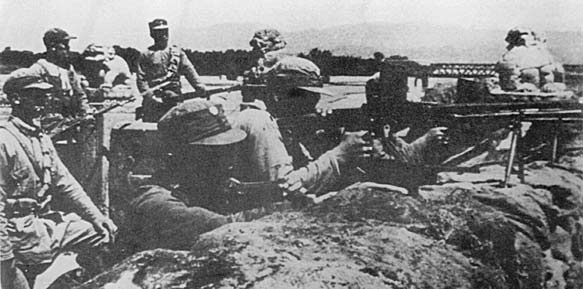 |
|
The Chinese army engages the Japanese at Lugou Bridge, or Marco Polo Bridge, near Beijing in 1937. The photo was released by the Second Historical Archives of China. [Photo/Xinhua] |
China's Victory Parade commemorates the Chinese People's War of Resistance Against Japanese Aggression and China's contribution to the World War against fascism. Because the outcome of these gigantic events powerfully shapes our present world they require precise assessment.
The men and women of every country who fought Japan and Nazi Germany from 1931-1945 showed the greatest courage and self-sacrifice. I emphasise this from personal knowledge available to younger generations outside China as well as within it. My father-in-law, now 95 years old, was in the Allied army which landed in France on D-Day in June 1944. From many conversations with him I know the extreme danger of that day, and the acts of bravery and self-sacrifice performed that day, which indelibly mark his views 70 years later. When living in Russia from 1992-2000 the father of my assistant, a high-ranking military specialist, still went to his office although he was over 80 to contribute his knowledge to his country. Veterans of China's resistance to Japanese aggression immediately understand such people.
I stress this because the distortion of the history of World War II in the West is something intellectually shameful and not merely a historical matter. The view of World War II typically presented in the Western media, notably by Hollywood, is that the World War against fascism was won by American marines who advanced across Pacific Islands while the D-Day landing in France created victory in Europe. The facts tell a different story.
The US lost 420,000 military and civilian dead in World War II, the UK 450,000. China lost over 30 million, over 90% of the deaths in the Asian theatre of the war, while the USSR lost 27 million dead against Nazism. The overwhelming majority, almost three quarters, of Japan and Germany's troops fought not the US or Britain but China and the USSR.
Japan's strategy for fighting the Asian war was explicit - to damage the US fleet at Pearl Harbour and then form a hardened defensive Pacific perimeter which would grind down US attacks until the US negotiated a settlement allowing Japan to retain part of its Asian gains.
The scale of China's resistance destroyed Japan's strategy. At the time of Pearl Harbour 80% of Japan's troops were in China. They could never be released to form the Pacific perimeter against the US due to China's resistance. Japan launched repeated attacks in China including in 1944 using 500,000 troops in the Ichi-Go offensive. This was almost twenty five times the 21,000 Japanese troops that fought the US at Iwo-Jima or more than six times the 76,000 regular Japanese troops that defended Okinawa. Given appalling US casualties in both battles if Japan had been able to release hundreds of thousands of troops from China to defend its Pacific perimeter the total Allied victory in Asia's war at worst might not have been achieved, and at best would have involved far greater US causalities.
Unlike Hollywood China is not seeking any pre-eminent position. It states every country that participated in the greatest military conflict in human history, the World War to defeat Japanese aggression and Nazism, played a vital role. The sole reason the present generation enjoys relative peace and prosperity, and are not called upon to show the same courage as the generation of 1931-45, is because of that gigantic earlier sacrifice. But regarding such immense events there are two great truths. Individually the courage of combatants of every country participating in the great defeat of aggression and fascism was equal, and that in that struggle no country played a greater role than China.
The author is a Senior Fellow at Chongyang Institute for Financial Studies, Renmin University of China.